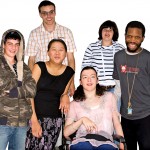
Rob Allison explores a recent qualitative study of dependence and resistance in community mental health care, which looks at negotiations of user participation between mental health staff and service users.
[read the full story...]
Rob Allison explores a recent qualitative study of dependence and resistance in community mental health care, which looks at negotiations of user participation between mental health staff and service users.
[read the full story...]
Victoria Betton reports on the LYNC study; mixed methods research into timely digital patient-clinician communication in specialist clinical services for young people.
[read the full story...]
Paul Ramchandani and Ellen Grimas report on the findings of a recent systematic review and meta-analysis of modifiable partner factors associated with perinatal depression and anxiety.
[read the full story...]
Hannah Morgan examines a study on social care for disabled men living with long term conditions and discovers the importance of agency, choice and control.
[read the full story...]
In this blog, Sarah Carr examines a systematic review into the psychosocial factors that help and hinder mental health recovery and discusses implications for policy.
[read the full story...]
Jill Manthorpe gets to grips with a systematic review of qualitative research to find out how older people experience social care support and calls on a surprising literary character for help.
[read the full story...]
Mary Larkin explores a systematic review on attachment between people with dementia and their carers and explains what the findings mean for social care practice and policy for carers.
[read the full story...]
People with learning disabilities need to be able to talk about sexuality, sex and relationships, but often this opportunity is denied or is heavily influenced by existing social and cultural norms.
In this, her debut blog, Michelle Gregory looks at a paper which reports on how one self advocacy group tackled this issue and how they disseminated their findings.
[read the full story...]
Martin Webber looks at a rare social work randomised controlled trial (RCT) on relationship training for practitioners working with children and families and finds that even findings from a study using ‘gold standard’ research methodology have to be carefully examined for reliability.
[read the full story...]
Friendships and relationships are usually the things that most people will say are important to them in describing their quality of life. Many people with learning disabilities however have very limited opportunities to meet and make friends. The people in their social networks may be family members, or people who are paid to support them. [read the full story…]